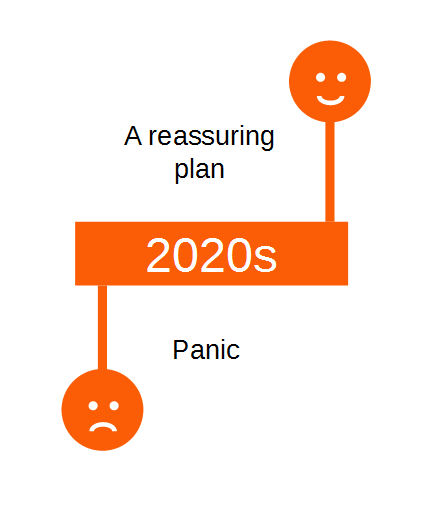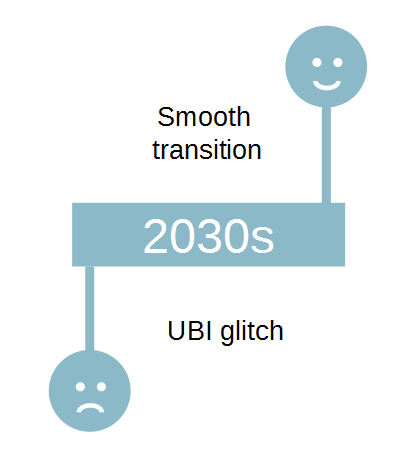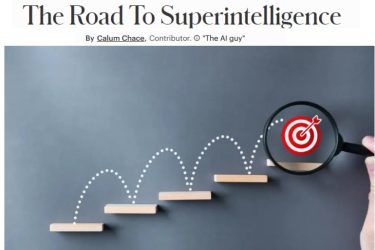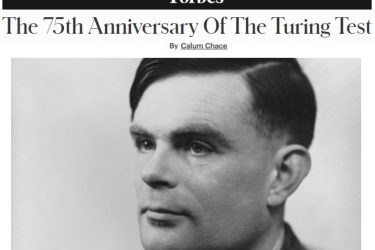Peviously on this blogpost…
We reviewed the concept of the Economic Singularity, and asked whether automation by machine intelligence will be different from previous rounds of automation. We identified three potential dangers – one for each of the coming three decades. Read on…
1. The 2020s
The danger: Panic

It is the mid-2020s, and self-driving vehicles (now called “autos”) are widespread. They are well on the way to being universal in commercial vehicles, including trucks, delivery vans, taxis, buses and coaches. As a result most of the five million Americans who used to drive for a living (and the three-plus million whose jobs depend directly on truckers) are now unemployed, and many of them are struggling to find new jobs.
This has not escaped the attention of doctors, lawyers, accountants, factory workers, nurses, short order chefs and gardeners. There is widespread understanding of how powerful machine intelligence has become, and how fast it is still improving. People in every walk of life have realised that their turn is coming – maybe not this year, but soon. They are scared, and wondering how best to position themselves and their families to survive the coming jobs holocaust.
Some of the people who are lucky enough to own their own homes have already started selling them, in order to have as much cash on hand when their incomes dry up. As a result, house prices are tumbling, consumer and business confidence is very low: the world’s largest economies are heading towards a severe recession.
In the absence of a sensible-sounding plan from the incumbent political leadership, populist politicians are gaining strength everywhere, promising impossible rewards for their followers and threatening dire consequences for those who oppose them – at home and especially abroad. We have seen this movie before, and it is not attractive.
The happy scenario: a reassuring plan
Business and political leaders woke up to the possibility of technological unemployment in the second half of the 2010s. It started with a few wild-eyed futurists and writers, and the ideas were taken up by policy wonks and by retired politicians who had nothing left to lose by saying the unsayable. Conferences, colloquia and seminars started to be organised, and pretty soon they were springing up everywhere. Senior executives from the technology giants who were making the intelligent machines got over their reluctance to speculate and address the issue. Economists (but not The Economist) were the last to come around, and as usual they were largely ignored.
Initially, everybody saw the coming changes through the prisms of their pre-existing ideologies and obsessions, but eventually a consensus emerged about the most acceptable outcomes and how to achieve them. People were scared about the future, but not as much as they were excited by it. Humanity had a plan, and we believed in it.

2. The 2030s
The danger: UBI glitch

It is the late 2020s, and everyone accepts that a large majority of people will soon be rendered unemployable by machine intelligence. The debate about how to respond is never out of the headlines of the blogs and the mainstream news media. (Yes, that still exists.) Most people agree that some form of Universal Basic Income (UBI) needs to be introduced. Welfare systems are buckling under the weight of claims by the newly unemployable, and the unemployed are incensed by the poor quality of life that their welfare payments allow.
But not everyone agrees about the wisdom of introducing UBI: the concept has been sullied by a disastrous experiment mounted a few years earlier in Austria. A discredited far-right government was succeeded by a coalition of leftists and techno-optimists, who persuaded their electorate that Austria could blaze a trail for the world and strike a blow against injustice and inequality by unilaterally introducing UBI.
Warnings were sounded both internally and abroad that the result would be a “giant sucking sound”, as all the rich people moved themselves and their assets elsewhere before they could be seized to pay for the UBI. Draconian measures were introduced to prevent capital flight, but were only partly successful, and they led to a collapse of business confidence and investment. The idealistic government pressed ahead, heedless of warnings about an inevitable influx of economic migrants which could not be prevented under the rules of the European Single Market.
Austria’s economy duly imploded, and the government was hounded out of office. The cost to the EU (and in particular, to Germany) of the subsequent rescue was enormous, but the cost to the Austrian people was higher. Another cost was the damage to idea of UBI, and the blow to a consensus which had been developing about the need for it, and how to introduce it.
As the year 2030 approached, many countries were torn by unrest as large numbers of people accustomed to a comfortable life found themselves on the breadline. Thousands were killed in riots, and the severe repression which followed. Eventually, after a series of stumbling crisis talks between political leaders, a global UBI was successfully introduced, funded by taxation of the enormous revenues being generated by the owners of the most advanced AI systems. One of the biggest hurdles to agreement in these talks was that the AI titans were concentrated in the US and China, whose politicians were hard-pressed to overcome the siren call from vocal minorities within their electorates to allow Europe and the developing world find (and fund) their own solutions to the crisis.
The happy scenario: a smooth transition
In its short history, humanity has often repeated the same mistakes – sometimes over and over again. But at times it does respond well to a crisis, and this capability has been enhanced by the advent of worldwide mass communication, especially the Web, and the rise of Big Data and intelligent machines, which enabled us to improve the tracking and analysis of economic and social developments.
As soon as the result of the Austrian elections were known, a small group of world leaders who foresaw the inevitable outcome determined to use it as a prompt for a worldwide agreement on the need for a globally co-ordinated and funded introduction of UBI. The group included the political leaders of the US and China, and also the founders of the biggest AI titans.
As Europe picked up the pieces from the wreckage of the Austrian economy, this group unveiled its proposals, and a grateful world rallied around them.



